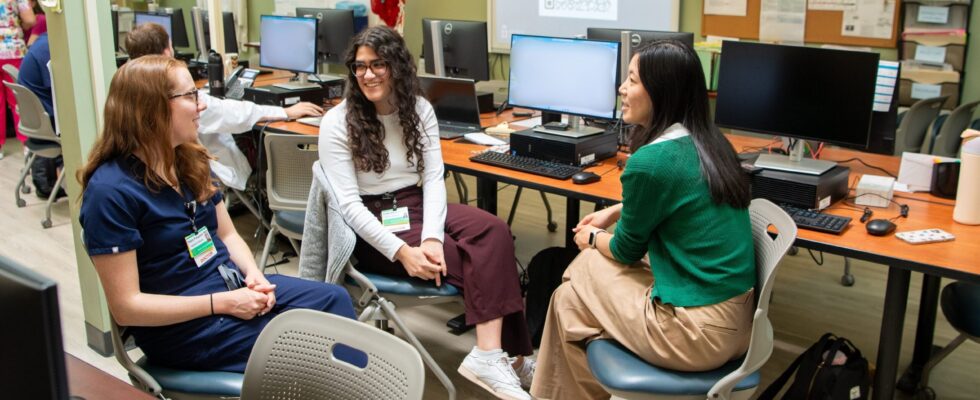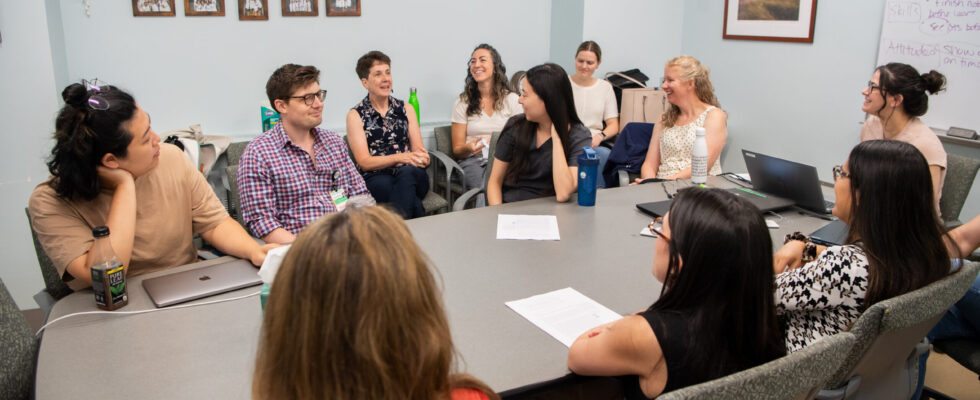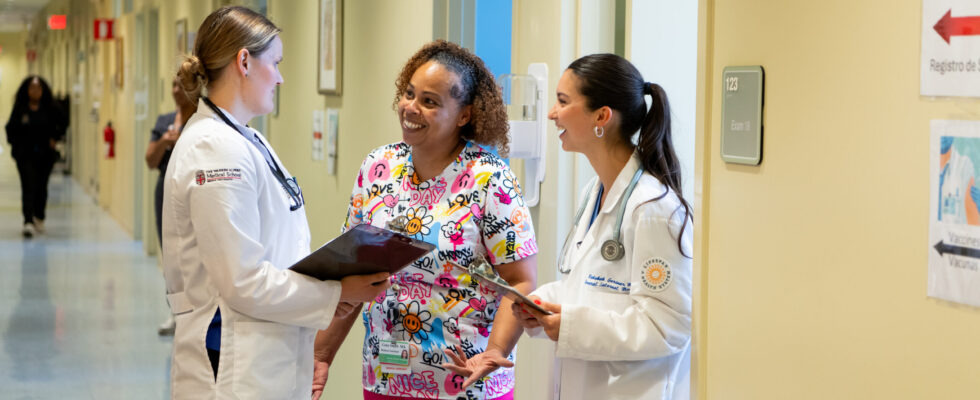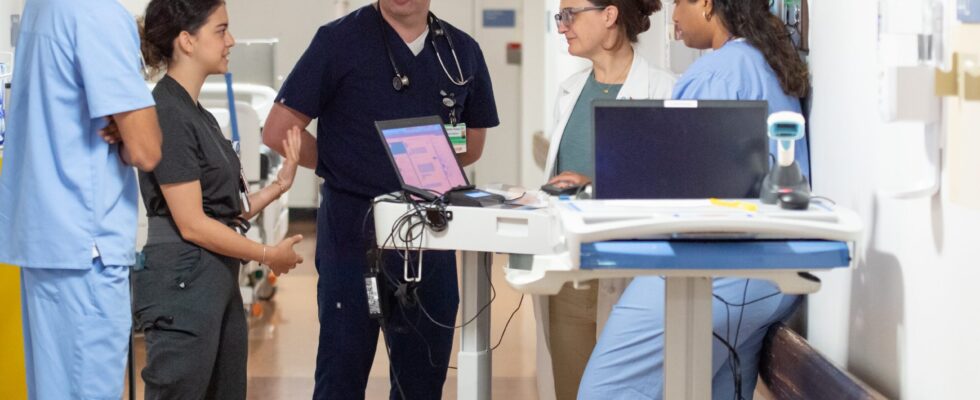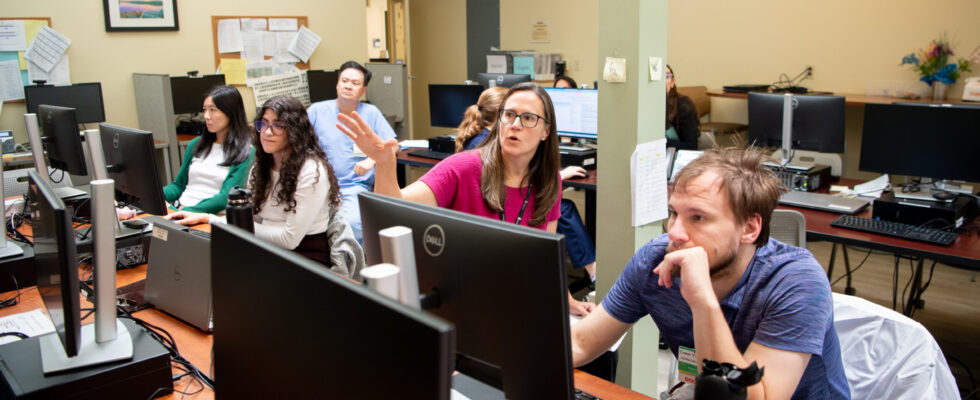Our General Internal Medicine Residency aims to provide a balance of ambulatory and inpatient educational experiences to foster the growth and development of the consummate generalist. Our program leadership believes that the exceptional generalist embodies the core values of medicine – medical knowledge, humanism, and professionalism – these are what we strive to develop in our trainees. Our overarching mission is to provide you with the skills and tools necessary to go on to careers in clinical medicine, academic medicine, research and leadership.
Our History
Created in 1979, the Warren Alpert Medical School of Brown University General Internal Medicine Residency Program is one of the oldest primary care programs in the country. At its inception, the goal was to develop a model internal medicine residency program with a primary care focus. Additionally, we have always devoted a substantial portion of the curriculum to psychiatric and psychological issues in health and disease, recognizing its importance in primary care. Distinct blocks of ambulatory experiences were begun and remain a core part of our program today. We pride ourselves on continued innovation and believe that by continuing to change, we provide the best training in primary care possible.
Ambulatory Training in the Primary Care Track
We are excited to announce that beginning in July 2026, our residency program will offer a comprehensive and immersive ambulatory experience structured through an X+Y schedule. This model allows residents to dedicate every other month exclusively to ambulatory education and outpatient care, fostering deeper learning, continuity with patients, and greater focus on developing primary care expertise.
At the heart of the program is our Intergenerational Ambulatory Time, where residents across all years of training come together to learn core elements of primary care, build teaching skills, and collaborate with peers. This shared experience creates community, strengthens mentorship across classes, and prepares residents to serve as both clinicians and educators.
New in our X + Y format, interns will participate in a Primary Care Second Site experience, an experience traditionally reserved for senior residents. This unique opportunity places them in a community-based clinic from the time they join our program, offering early exposure to primary care practice in diverse settings, emphasizing the value of building longitudinal patient relationships.
Ambulatory Curriculum
Time in ambulatory blocks is devoted to learning practical skills for the general internist and includes exposure to the full spectrum of outpatient internal medicine and its intersection with subspecialty care. Approximately one-third of time is dedicated to the resident’s own continuity clinic, one-third to subspecialty ambulatory rotations, and the remaining portion to a robust didactic curriculum.
The structured curriculum covers essential areas of primary care, including Women’s Health, Psychosocial Medicine, evidence-based practice, primary care orthopedics, professional development, and weekly ambulatory morning report. Residents also participate in Primary Care Journal Club, one of the longest-running academic journal clubs in the country, and in special seminars developed through the Center for Primary Care Curriculum, co-created by residents and faculty.
Psychosocial Aspects of Ambulatory Medicine
One major emphasis of the program is the psychiatric and psychosocial aspects of medicine. This curriculum has remained one of the distinguishing features of our program. For over thirty years, this curriculum has supported residents in reflecting on the development of their own style in clinical practice, focusing on maintenance of empathy, growing positive communication with patients and families, and caring for marginalized patients.
In their first and second years, residents attend a three-hour Psychosocial Medicine seminar every week that they are on Block. The Psychosocial Medicine seminars are led by a multi-disciplinary team comprised of a clinical psychologist, a psychiatrist and a general internist with specialization in palliative care and addiction.
In the first year, Psychosocial Medicine covers fundamental skills of clinical work such as motivational interviewing, strategies for thriving in a busy outpatient clinic, communicating with families, harm reduction approaches to caring for people with substance use disorders, shared decision making and tools for addressing social determinants of health. Concurrent to these seminars, the interns complete a separate lecture series on topics in psychiatry. Throughout the second year, residents draw from their clinical experience to engage in interactive discussions about caring for patients who have mental illness, obesity, chronic pain or substance use. They learn about effective pharmacological treatments and cognitive-behavioral therapy techniques that can be employed or discussed in primary care settings. Second-year residents also engage in a curriculum around caring for marginalized patients through seminars on the history of race/racism in medicine, refugee health, gender-affirming care and working with patients who have a history of incarceration.
At the start of each Block, time is devoted to talking with the interns and residents regarding their previous rotations with the goal of providing support and providing an opportunity to debrief the challenges faced throughout residency training. Graduates draw upon the information learned in these seminars throughout their careers.
Primary Care Journal Club
Primary Care Journal Club (PCJC) is one of the longest running academic journal clubs in the country, occurring weekly. A resident and faculty member work together to choose and develop a topic based on a recent article from the medical literature. Topics cover the full spectrum of medical care problems and issues that confront physicians today. Group discussions provide a forum for debating primary care topics. The PCJC gives the resident an opportunity to learn the skills of critical appraisal of the literature and presentation, working closely with a faculty member. This conference is highly regarded throughout the institution.
Ambulatory Medicine Seminars
In the ambulatory medicine seminars, a faculty member presents a topic in which he or she has expertise. Topics include hypertension, diabetes, substance abuse, women’s health, clinical epidemiology/biostatistics, adolescent medicine, geriatrics/hospice and HIV management. Seminar topics are chosen based on their importance to outpatient practice. Two additional specific seminar series are presented during ambulatory block. A course in critical appraisal of the medical literature allows residents to formally learn skills important to the practice of evidence-based medicine. Clinical teaching skills are taught in a seminar series, which focuses on the theory and practice of effective clinical teaching. The Seminar is run by one of our revered faculty members who attended the Stanford Faculty Development Course for Clinical Teaching.
Curriculum Innovation
Residents are encouraged to innovate and contribute to the teaching of their peers as well. We are exceptionally proud of the contributions made to the curriculum by recent residents. One example of resident contributions is our “Physician as Advocate” Curriculum which is now a highly regarded component of the curriculum. Another recent addition is our series of musculoskeletal workshops which enable our residents to learn important physical exam maneuvers that they then practice performing in a hands-on manner. This has been extremely well received and includes learning about the knee, shoulder, hip, and back.
Our Practice Management Curriculum takes place during third year block. The seminars include topics such as “Understanding Our Healthcare System,” “The Patient Centered Medical Home,” and “Understanding Billing and Coding.” There is still much flexibility in the month, with residents having ample time to do scholarly work and/or additional ambulatory experiences..
Our Clinic Experience
The home for our longitudinal clinic is the Center for Primary Care located a short 5 minute drive from Rhode Island Hospital in Providence. Our patients are from the area surrounding the hospital and clinic. We have a diverse patient population including long term relationships with many different refugee populations. About 40% of our patients speak a language other than English. At our clinic the support staff include MAs, RNs, LPNs, Social Workers, psychiatry liaison, community health workers, diabetes educators and clinical pharmacists. The services include an outpatient procedure clinic that we get to participate in, and many additional clinical opportunities and experiences. See more about the clinic here.
Our Inpatient Experience
The Internal Medicine Residency at Brown Medical School provides training at three sites: The Miriam Hospital, Rhode Island Hospital, and the VA Medical Center. By offering a multi-institutional training program, we provide our residents with several distinct, diverse populations of patients, training environments, and complementary institutional cultures. Together these institutions represent an array of faculty that, in its depth and breadth, offers residents an exceptional opportunity for education and professional growth. General Internal Medicine residents have the same inpatient experiences as the Categorical residents.
Our Career Development
Our residency is based in the Rhode Island Hospital Division of General Internal Medicine, one of the largest divisions in the department of medicine. Our residents develop close working relationships with division faculty who are leaders in primary care education, research and clinical practice. Upon entry into the program, interns are assigned faculty advisors to aid them in career planning and resident advisors to help transition them from medical school to residency.
Throughout their training, residents receive regular evaluation and feedback, career guidance, and have an opportunity to contribute new and creative ideas in a highly receptive atmosphere. Our learning environment is one in which the values of collegiality and teamwork are paramount to providing outstanding patient care. We strive to improve the lives of our patients every day. In working toward this goal, we pride ourselves on having a non-hierarchical approach to patient care and education, one in which all members are valued and diversity of opinions are respected. We also strive to learn something new every day and to have fun while practicing medicine. Our residents and our faculty embody this spirit.
Society for General Internal Medicine
The Society for General Internal Medicine (SGIM) is the national professional organization for general internal medicine faculty and residents. Each year the program sends residents to the regional and national meetings of SGIM where they attend workshops, mini-courses and presentations concerning all aspects of general internal medicine and primary care. Each year faculty and residents present their research findings at these meetings. Membership in the society allows for important interactions that facilitate professional growth and future career connections.
American College of Physicians
The American College of Physicians (ACP) is a diverse community of internal medicine specialists and subspecialists united by a commitment to excellence. The ACP is the largest medical-specialty society in the world. ACP and its physician members lead the profession in education, standard-setting, and the sharing of knowledge to advance the science and practice of internal medicine.
Rhode Island has an active local Chapter. Dr. Kelly McGarry is the immediate past-Governor of the RI Chapter (serving until 2023). Our annual meeting is a venue for residents to learn and to
engage in scholarship, with opportunities to present original research and clinical vignettes. We also support residents attending national ACP meetings if their scholarship is selected to be presented and we send residents to local and national Leadership Day, a day of advocacy each year
Our Graduates
We are exceptionally proud of our program graduates. They have gone on to make significant contributions to internal medicine, both in the US and abroad. Some have entered internal medicine practice, fellowships in general internal medicine and subspecialties, and careers in public health, health administration and academic medicine. Many graduates have developed careers as clinician-educators (including becoming Program Directors!) and researchers. Others have gone on to serve vulnerable populations, including working for the Indian Health Services, at Community Health Centers as well as working in practices dedicated to the care of those affected by HIV. Our residents have matched in highly competitive fellowships, including the Robert Wood Johnson Clinical Scholars Program and in General Internal Medicine Fellowships throughout the US. Some have gone on to work with the Epidemiologic Intelligence Agency at the CDC, while others have worked internationally for several years after completing their training. Our aim is to help foster and nurture our residents’ professional growth and development, helping each one achieve the next phase of their career.

